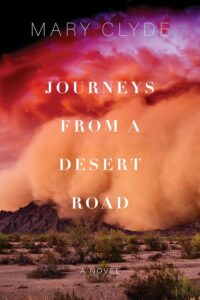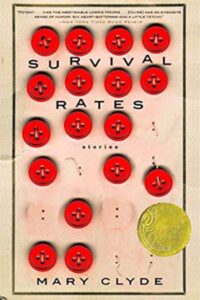 Mary Clyde introduces her new novel, Journeys from a Desert Road, published this month by Signature Books.
Mary Clyde introduces her new novel, Journeys from a Desert Road, published this month by Signature Books.
THE QUESTION OF SAD
It typically happened near a semester’s sixth week: one of my college students would timidly raise a hand: Are we ever going to read something that isn’t sad? Seconded by another student, This stuff is so depressing! Fellow students often chimed in. Ah, I’d think, there it is. Again. Yet even with the question’s reappearance, it always gave me pause. I was a little hurt, like a mother asked something unflattering about her infant. Isn’t she so fat? Adding to my pain, I didn’t think what we were reading was particularly sad, and more than that, I was concerned that students’ valuation of literature seemed based on its “happiness.” Was happily ever after the gold standard of good fiction?
My responses to “the sad question” varied. Sometimes I’d wearily explain what I thought they surely knew that the primary purpose of capital L literature was not to entertain but to enlighten, to open minds, to introduce questions, to offer new vistas, and to foster empathy and understanding. Sometimes my response was probably flippant, telling them to wait until they read Thomas Hardy’s Tess of the d’Ubervilles; Tess would show them a painful thing or two. Or I’d answer incredulously, maybe with a tinge of despair: Even if the story is steeped in pain, couldn’t they see the elegant structure and devastatingly splendid effect of William Faulkner’s alternating points of view in The Sound and the Fury? No? Really? Now that, I thought, was what was sad.
Sometimes, taking a perhaps more ambitious tack, I’d lecture that most popular fiction was like a sugar rush, a short, pleasurable burst offering nothing of substance and quickly dissolving. Literature—real literature—provides sustenance. Food for the mind and soul. And so on and on. I didn’t convince many of them. Probably, they—like me—had a fondness for sweets.
But the question of “happy” fiction stayed with me as a subliminal stress when I wrote Journeys from a Desert Road. Afterall, a traumatic brain injury and a nuclear bomb might not be everyone’s idea of fun, especially given that they occur in the name novel. When I finished the book, I asked my brother to proofread it, which he generously and expertly did. Returning it to me, he simply said, “Wow. That’s sad!”
“Sad?” I said, “Sad?” I love my brother. Besides, we are too old for name-calling. So, I clenched my teeth and thanked him, disappointed to discover he was such a philistine. I became an apologist for my novel, explaining to no one that the novel was more than simply sad. Also, the novel wasn’t always sad. And the novel, like life, was sometimes sad.
However, to be honest with myself, I couldn’t and can’t convincingly claim that my novel isn’t sad. Yes, the characters’ circumstances are difficult, sometimes harrowing. I feel a deep sympathy for these invented people, stitched, as they are, from my heart and experience. I’d written their dialogue and spoken it out loud to test its authenticity and emotion. I’d gazed at their desert setting—my home—a stark and unforgiving land even without a bomb. I had sat, as they sit, in a hospital room with a critically ill family member waiting for doctors, wringing my hands, trying to be hopeful. I could feel how distressing their circumstances are. Though the world I was inventing was invented, I felt it was serious.
Serious novels ask serious questions. One doesn’t read The Heart of Darkness without pondering what Kurtz’s “the horror” is. Joseph Conrad’s nemesis, Chinua Achebe, wrote a novel that has questions that spring from the title. All Things Fall Apart. What things? How? All things? Percival Edwards published James this year in partial response to questions raised by Mark Twain in Huckleberry Finn 139 years ago. Still searingly important issues of race, integrity, and relationships.
If my novel isn’t merely sad, but is serious, it must pose questions that merit worthwhile consideration. As I planned and wrote the novel, I wrestled with the idea of what a family would do if a beloved son’s future was in doubt, if his mind was beyond their reach? How would they deal with that? Could they summon illusive, vital traits like courage, patience, and resilience? Also, if someone could have thoughts in a coma, what would he think? If the comatose patient feels his family’s love, wouldn’t he imagine a world where he could return their love? Would he attempt to match their courage?
For me, the force that undergirds Journeys from a Desert Road and keeps it from being bleakly sad is love. The Wilson’s family’s love is why I don’t find the novel overwhelmingly sad. I admit that familial love isn’t always in the forefront of literature. Go ahead, reread King Lear. Oh, those sisters! It requires true fortitude to read Ian McEwan’s depiction of a dysfunctional family in Atonement. It’s hard not to look away. The family Leo Tolstoy chose to write about wasn’t one of the happy ones he mentions that are all alike. Anna Karenina’s opening lines stay with us because some families are realistically, uniquely unhappy. Dealing with one’s flesh and blood can be fraught.
But if family love in literature doesn’t exactly save the day, it shines light on days worth saving. A family’s love can be confused and confusing. Soothing, aching, powerful, tender. In James Agee’s A Death in the Family a family falters and grieves in the aftermath of the young father’s death. But Agee recounts the autobiographical story with such pure, loving detail that we experience the remaining family’s love and loss. We understand their connections. The novel is often praised as near perfect. While A Death in the Family is heartbreaking, counterintuitively, it is also redemptive. Human loss reveals the deep, intrinsic value of life. It shows how much love matters, what it can be and do. Thus, sad can be uplifting, focusing us, reminding us.
I often think of my former students, now likely with families of their own. Do they know by now the rarity—the impossibility—of living happily after? Do they understand how empty living happily ever after would be? I hope they’ve discovered the magic of literature, its gifts and complexity. Of course, I hope their family connections are loving and joyful because I agree with Robert Frost. “Earth’s the right place for love: I don’t know where it’s likely to go better.”
 Mary Clyde is the author of the short story collection Survival Rates, a 1999 Flannery O’Connor Award and AML Short Fiction Award winner. Her short fiction has appeared in journals and anthologies, including the Georgia Review, Quarterly West, Boulevard, and New Stories from the South. She earned an MA from the University of Utah and an MFA from Vermont College. She has taught undergraduate writing, literature, and graduate creative writing. She is the mother of five and a proud grandmother. She lives in Phoenix, Arizona, the granddaughter of people who settled in the Valley of the Sun in 1920.
Mary Clyde is the author of the short story collection Survival Rates, a 1999 Flannery O’Connor Award and AML Short Fiction Award winner. Her short fiction has appeared in journals and anthologies, including the Georgia Review, Quarterly West, Boulevard, and New Stories from the South. She earned an MA from the University of Utah and an MFA from Vermont College. She has taught undergraduate writing, literature, and graduate creative writing. She is the mother of five and a proud grandmother. She lives in Phoenix, Arizona, the granddaughter of people who settled in the Valley of the Sun in 1920.
Journeys from a Desert Road blurb:
When a sheer, brilliant light erupts in the desert night, Jack recognizes it as the awesome and destructive power of an atomic bomb. But in another world, far removed from Jack’s mind, his family sits by his side after a traumatic car accident has rendered him comatose. Jack, relying on fantasies he and his sister fabricated as teenagers, struggles to lead the people he loves out of radiation-contaminated Phoenix as his family keeps vigil in his hospital room, marshaling their reserves of patience and determination.
Yet even as Jack and his family experience these different realities, events from one world drift into the other, reshaping and influencing one another as they move toward a climactic union. Whether fleeing nuclear disaster or pacing by a sickbed, these flawed and stressed individuals behave with fierce loyalty and an equally fierce love that forces an ascension of hope and survival.

I can’t wait to read this. I loved Survival Rates and even teach one of its stories in my creative writing class. So glad to see another book from Mary Clyde.